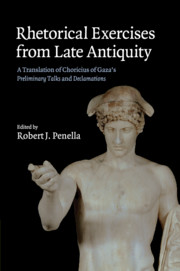 Rhetorical Exercises from Late Antiquity
Rhetorical Exercises from Late Antiquity Book contents
- Frontmatter
- Contents
- List of contributors
- Foreword
- Introduction
- I CHORICIUS, PRELIMINARY TALKS
- II CHORICIUS, DECLAMATIONS
- 2 Declamation 1 [X]:
- 3 Declamation 2 [XII]:
- 4 Declamation 3 [XIV]:
- 5 Declamation 4 [XVII]:
- 6 Declamation 5 [XX]:
- 7 Declamation 6 [XXIII]:
- 8 Declamation 7 [XXVI]:
- 9
- 10 Declamation 9 [XXXV]:
- 11 Declamation 10 [XXXVIII]:
- 12 Declamation 11 [XL]:
- 13 Declamation 12 [XLII]:
- Epilogue: The fortune and reception of Choricius and of his works
- Bibliography
- Index
6 - Declamation 5 [XX]: <The Young War-Hero>
from II - CHORICIUS, DECLAMATIONS
Published online by Cambridge University Press: 29 January 2010
- Frontmatter
- Contents
- List of contributors
- Foreword
- Introduction
- I CHORICIUS, PRELIMINARY TALKS
- II CHORICIUS, DECLAMATIONS
- 2 Declamation 1 [X]:
- 3 Declamation 2 [XII]:
- 4 Declamation 3 [XIV]:
- 5 Declamation 4 [XVII]:
- 6 Declamation 5 [XX]:
- 7 Declamation 6 [XXIII]:
- 8 Declamation 7 [XXVI]:
- 9 Declamation 8 [XXIX]:
- 10 Declamation 9 [XXXV]:
- 11 Declamation 10 [XXXVIII]:
- 12 Declamation 11 [XL]:
- 13 Declamation 12 [XLII]:
- Epilogue: The fortune and reception of Choricius and of his works
- Bibliography
- Index
Summary
[THEME]
A wealthy miser had a son whom he wished to marry off to a rich but ugly girl. The young man rejected the arrangement. Meanwhile, there was a festival, and, in the course of it, the young man saw and fell in love with another girl, beautiful but poor. He applied to his father to be allowed to marry her, but failed in his request. War broke out. He became a war-hero and, being allowed by the laws to choose his reward, asked to be given the woman he loved. His father opposes his plea. Let us take the part of the young man.
EXPLANATORY COMMENT
[1] The laws of our art find space even for sons in dispute with fathers. Imaginary cases in fact reflect all the types of case which real life offers. [2] The young man has many opportunities for attracting the favor of the people. He has routed the invading enemy, he has rescued his country from danger, he has the law on his side, he is asking for a modest reward, a girl from a poor family. Yet, despite this wealth of justification, he is not yet free of anxiety and has no great confidence in winning his case without effort. For this is a conflict between child and father, between poverty and wealth; and wealth is dear to all, and particularly highly valued by a miser. [3] We must expect him therefore to exhibit some youthful arrogance, but sometimes also to court favor.
- Type
- Chapter
- Information
- Rhetorical Exercises from Late AntiquityA Translation of Choricius of Gaza's Preliminary Talks and Declamations, pp. 110 - 124Publisher: Cambridge University PressPrint publication year: 2009


